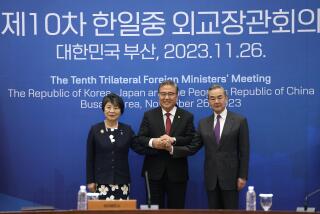China Vows to Help Revive N. Korea Talks
- Share via
SEOUL — China has pledged to try to revive talks aimed at ending North Korea’s nuclear program after the isolated, Stalinist state declared that it had atomic weapons and would continue to boycott disarmament negotiations, the Chinese Foreign Ministry said Sunday.
The United States and other countries involved in the six-party talks have urged China to use its influence over North Korea. Beijing is Pyongyang’s last major ally and a key supplier of food and energy to the impoverished dictatorship.
Chinese Foreign Minister Li Zhaoxing has told Secretary of State Condoleezza Rice that Beijing firmly supports a nuclear-free Korean peninsula, the Chinese government said Sunday.
Li told Rice by phone Saturday night that “China will stay in touch with all relevant parties ... so that the six-party talks could be resumed as soon as possible,” the Foreign Ministry said. The discussions also involve South Korea, Russia and Japan.
In addition, South Korea’s foreign minister said he had discussed with U.S. officials “views that China should strengthen efforts to persuade the North,” South Korea’s Yonhap news agency reported. Ban Ki Moon, in Washington on a previously scheduled trip, is to meet with Rice today.
North Korea announced Thursday that it had built nuclear weapons to defend itself from a U.S. invasion -- raising tensions in the two-year nuclear standoff. Washington has denied that it intends to attack.
A North Korean diplomat reportedly has requested direct talks with Washington as a way out of the impasse.
But the White House rejects such a move and insists that the six-party framework, which includes Japan and Russia, is the only appropriate setting for talks. Three rounds of multiparty negotiations have been held in Beijing with no breakthrough.
On Sunday, a North Korean district official in Pyongyang said the withdrawal of U.S. troops from the Korean peninsula would help revive six-party talks.
Han Song Nam, a deputy chairman for a district in Pyongyang of the country’s Communist party, said it “would be a practical measure in the withdrawal of the United States’ hostile policy,” according to Yonhap, which monitors North Korea’s Radio Pyongyang.
Washington has been South Korea’s key security ally since the 1950-1953 Korean war, and keeps thousands of troops there and in neighboring Japan.
Ban, the South Korean foreign minister, said in an interview on CNN’s “Late Edition” on Sunday that he was confident in Washington’s ability to deal with any emergency on the Korean peninsula.
Asked whether he was concerned the Iraq war might leave U.S. forces stretched too thin, Ban said: “We think that the United States has enough capabilities to deal with all these regional conflicts while they are concentrating their military forces in Iraq. I think the United States and Koreans in close combined defense capabilities can maintain and can deal with any threats.”
North Korea did not say how many nuclear bombs it had, but Australian Foreign Minister Alexander Downer said Sunday that his country suspected it had two or three. He also warned that North Korea’s declaration could spur proliferation in Asia.
Delaware Sen. Joseph R. Biden Jr., the top Democrat on the Foreign Relations Committee, said Pyongyang’s move could push Japan to “go nuclear.”
More to Read
Sign up for Essential California
The most important California stories and recommendations in your inbox every morning.
You may occasionally receive promotional content from the Los Angeles Times.













